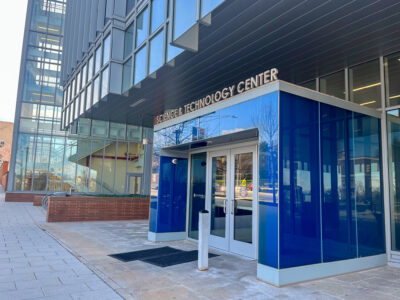The crowd at Digital Harbor Foundation’s October EdTech Meetup.
As Technically Baltimore has reported, Baltimore city and the surrounding counties are quickly becoming a broader hub of education-technology activity.
The Economic Alliance of Greater Baltimore says as much in its new report, writing: “No region is better positioned for the launch of a new EdTech company.”
Perhaps the most compelling reason why Baltimore is well positioned to take full advantage of education technology is, as Betamore co-founder (and Technically Baltimore partner) Mike Brenner has said, “There’s a lot of opportunity to innovate a failing product here.”
Indeed, while Maryland state public schools have been ranked the top schools in the nation for four consecutive years by Education Week, Baltimore city public schools, on the other hand, have catching up to do. Many of the city’s 35 public high schools, for instance, receive below-average marks with respect to college readiness, according to the U.S. News & World Report.
In other words, it’s innovation with a purpose when it comes to using technology to improve education (and educational outcomes), something gb.tc has stressed in its two civic hackathon events this year, UnWIREd and Groundwork, and something on display just two days ago at Startup Weekend Education.
Read the EAGB report here, which was “written on the heels of an executive mission taken by the EAGB to New York City” where people representing “[Baltimore city] government, academia and industry arrived with a purpose in mind … to discover the innovations and collaborations that were accelerating the growth of EdTech and coworking” in New York City.
In Baltimore in the last year, several EdTech startups have been formed, including Course Canary, Common Curriculum and the Federal Hill-based Digital Harbor Foundation, its particular mission being to use technology to make education more effective (and easier) for teachers and learning more palatable for students — not to mention, through web design work sponsored by the STEM Engine program, more practical.
Older startups, like StraighterLine, have been in Baltimore for several years, anchoring the city’s growth in the education technology space. Nonprofits like Digit All Systems see education and technology as inextricably linked, with tech being the tool to get Baltimoreans jobs. This is a point UMBC president Freeman Hrabowski stressed at the EAGB annual meeting when he told the crowd that they must “see technology throughout our society,” not only in the ubiquitous iPhone, but also as a way to make the city a better place to live and work for its citizens.
With the opening of Betamore this week, which features a 50-person classroom inside a conventional coworking space, a new focus has been placed on educating many people and equipping them with skills needed to become competent software engineers and programmers.
From the EAGB report, five advantages to starting an education-technology company here:
- First-class education in public schools, private schools, and numerous universities;
- A wide variety of funding opportunities with a history of funding education initiatives;
- A talented, educated workforce with a large number of tech professionals;
- Fluid commuting patterns allow Baltimore labor market to extend into DC metro;
- A network of advocates for tech in the classroom and teachers with ideas to share.
Join the conversation!
Find news, events, jobs and people who share your interests on Technical.ly's open community Slack

Baltimore daily roundup: Bowie State's esports reputation; AI impersonator arrested; EpiWatch names new CEO

Baltimore daily roundup: Real estate deal in the Peninsula; Missing $100M nitrile glove factory; Dirt bike clampdown

Baltimore daily roundup: Gen AI's software dev skills; UpSurge Tech Ecosystem Report; MD service year program

